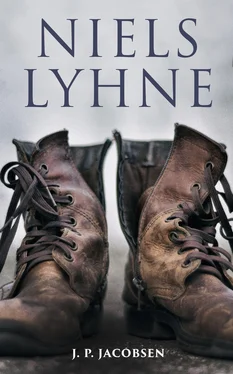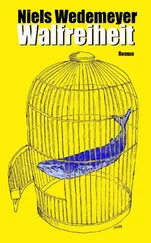J. P. Jacobsen - Niels Lyhne
Здесь есть возможность читать онлайн «J. P. Jacobsen - Niels Lyhne» — ознакомительный отрывок электронной книги совершенно бесплатно, а после прочтения отрывка купить полную версию. В некоторых случаях можно слушать аудио, скачать через торрент в формате fb2 и присутствует краткое содержание. Жанр: unrecognised, на английском языке. Описание произведения, (предисловие) а так же отзывы посетителей доступны на портале библиотеки ЛибКат.
- Название:Niels Lyhne
- Автор:
- Жанр:
- Год:неизвестен
- ISBN:нет данных
- Рейтинг книги:4 / 5. Голосов: 1
-
Избранное:Добавить в избранное
- Отзывы:
-
Ваша оценка:
- 80
- 1
- 2
- 3
- 4
- 5
Niels Lyhne: краткое содержание, описание и аннотация
Предлагаем к чтению аннотацию, описание, краткое содержание или предисловие (зависит от того, что написал сам автор книги «Niels Lyhne»). Если вы не нашли необходимую информацию о книге — напишите в комментариях, мы постараемся отыскать её.
Niels Lyhne — читать онлайн ознакомительный отрывок
Ниже представлен текст книги, разбитый по страницам. Система сохранения места последней прочитанной страницы, позволяет с удобством читать онлайн бесплатно книгу «Niels Lyhne», без необходимости каждый раз заново искать на чём Вы остановились. Поставьте закладку, и сможете в любой момент перейти на страницу, на которой закончили чтение.
Интервал:
Закладка:
He regarded it as a piece of great good fortune that his Sunday jacket happened to be degraded, just then, to every-day use; for the lingering scent of attar of roses was like a mighty talisman with which he could conjure up in a magic mirror the image of Edele as he had seen her lying on the green couch wearing her masquerade costume. In the story he and Frithjof were telling each other, this image was ever present, and from now on the wretched Frithjof was never safe from bare-footed princesses. If he dragged himself through the dense primeval forest, they would call to him from hammocks of vines. If he sought shelter from the storm in a mountain cave, they would rise from their couches of velvety moss to welcome him, and when he dashed, bloody and smoke-blackened, into the pirate’s cabin, shivering the door with a tremendous blow of his sabre, he found them there too, resting on the captain’s green sofa. They bored him terribly, and he could not see why they should suddenly have become so necessary to their beloved heroes.
* * * * *
No matter in how exalted a place a human being may set his throne, no matter how firmly he may press the tiara of the exceptional, that is genius, upon his brow, he can never be sure that he may not, like Nebuchadnezzar, be seized with a sudden desire to go on all-fours and eat grass and herd with the common beasts of the field.
That was what happened to Mr. Bigum when he quite simply fell in love with Miss Edele, and it availed him nothing that he distorted history to find an excuse for his love by calling Edele Beatrice or Laura or Vittoria Colonna, for all the artificial halos with which he tried to crown his love were blown out as fast as he could light them by the stubborn fact that it was Edele’s beauty he was in love with; nor was it the graces of her mind and heart that had captivated him, but her elegance, her air of fashion, her easy assurance, even her graceful insolence. It was a kind of love that might well fill him with shamed surprise at the inconstancy of the children of men.
And what did it all matter! Those eternal truths and makeshift lies that were woven ring in ring to form the heavy armor he called his principles, what were they against his love? If they really were the strength and marrow and kernel of life, then let them show their strength; if they were weaker, let them break; if stronger—But they were already broken, plucked to pieces like the mesh of rotten threads they were. What did she care about eternal truths? And the mighty visions, how did they help him? Thoughts that plumbed the unfathomable, could they win her? All that he possessed was worthless. Even though his soul shone with the radiance of a hundred suns, what did it avail, when his light was hidden under the ugly fustian of a Diogenes’ mantle? Oh, for beauty! Take my soul and give me my thirty pieces of silver—Alcibiades’ body, Don Juan’s mantle, and a court chamberlain’s rank!
But, alas, he had none of these graces, and Edele was by no means attracted to his heavy, philosophic nature. His habit of seeing life in barbarously naked abstractions gave him a noisy dogmaticism, an unpleasant positiveness that jarred her like a misplaced drum in a concert of soft music. The strained quality of his mind, which always seemed to knit its muscles and strike an attitude before every little question like a strong man about to play with iron balls, seemed to her ridiculous. He irritated her by his censorious morality, which pounced on every lightly sketched feeling, indiscreetly tearing away its incognito, rudely calling it by name, just as it was about to flit past him in the course of conversation.
Bigum knew very well what an unfavorable impression he made and how hopeless his love was, but he knew it as we know a thing when we hope with all the strength of our soul that our knowledge is false. There is always the miracle left; and though miracles do not happen, they might happen. Who knows? Perhaps our intelligence, our instinct, our senses, in spite of their daylight clearness, are leading us astray. Perhaps the one thing needful is just that unreasoning courage which follows hope’s will-o’-the-wisp as it burns over seething passions pregnant with desire! It is only when we have heard the door of destiny slam shut that we begin to feel the iron-cold talons of certainty digging into our breast, gathering slowly, slowly around our heart, and fastening their clutches upon the fine thread of hope on which our world of happiness hangs: then the thread is severed; then all that it held falls and is shattered; then the shriek of despair sounds through the emptiness.
In doubt, no one despairs.
On a sunny afternoon in September, Edele was sitting on the landing of the half-dozen broad, old-fashioned steps that led down from the summer parlor into the garden. Behind her, the French windows were wide open, flung back against the motley wall-covering of bright red and bright green vines. She leaned her head against a chair piled high with large black portfolios, and held an etching up before her with both hands. Color prints of Byzantine mozaics in blue and gold were scattered on the pale green rush matting that covered the boards of the landing, on the threshold, and on the oak-brown parquet floor of the summer parlor. At the foot of the steps lay a white shade hat; for Edele’s hair was uncovered, with no ornament but a flower of gold filigree in a pattern to match the gold bracelet she wore high on her arm. Her white dress was of semi-transparent stuff with narrow silky stripes; it had an edging of twisted orange and black chenille and tiny rosettes in the same two colors. Light silk mitts covered her hands and reached to the elbow. They were pearl gray like her shoes.
The yellow sunlight was filtered through the drooping branches of an ancient ash. It pierced the cool dimness, forming distinct lines of light, powdering the air with gold dust, and painting the steps, the wall, and the doors with spots of light, spot of sun upon spot of sun, like a perforated shade. Through the tracery of shadow, each color rose to meet the light: white from Edele’s dress, blood-red from crimson lips, amber from yellow-blonde hair, and a hundred other tints round about, blue and gold, oak-brown, glitter of glass, red and green.
Edele dropped the etching and looked up despondently, her eyes expressing the silent plaint she was too weary to give vent to in a sigh. Then she settled down again as if to shut out her surroundings and withdraw within herself.
Just then Mr. Bigum appeared.
Edele looked at him with a drowsy blinking like that of a child who is too sleepy and comfortable to stir, but too curious to shut its eyes.
Mr. Bigum wore his new beaver hat. He was absorbed in his own thoughts, and gesticulated with his tombac watch in his hand, until the thin silver chain threatened to snap. With a sudden, almost vicious movement, he thrust the watch deep down into his pocket, threw back his head impatiently, caught the lapel of his coat in a peevish grasp, and would have gone on with an angry jerk of his whole body, his face darkened by all the hopeless rage that boils in a man when he is running away from his own torturing thoughts, and knows that he runs in vain.
Edele’s hat, lying at the foot of the steps and shining white against the black earth of the walk, stopped him in his flight. He picked it up with both hands, then caught sight of Edele, and as he stood trying to think of something to say, he held it instead of giving it to her. Not an idea could he find in his brain; not a word would be born on his tongue, and he looked straight ahead with a stupid expression of arrested profundity.
“It is a hat, Mr. Bigum,” said Edele carelessly, to break the embarrassed silence.
“Yes,” said the tutor eagerly, delighted to hear her confirm a likeness that had struck him also; but the next moment he blushed at his clumsy answer.
Читать дальшеИнтервал:
Закладка:
Похожие книги на «Niels Lyhne»
Представляем Вашему вниманию похожие книги на «Niels Lyhne» списком для выбора. Мы отобрали схожую по названию и смыслу литературу в надежде предоставить читателям больше вариантов отыскать новые, интересные, ещё непрочитанные произведения.
Обсуждение, отзывы о книге «Niels Lyhne» и просто собственные мнения читателей. Оставьте ваши комментарии, напишите, что Вы думаете о произведении, его смысле или главных героях. Укажите что конкретно понравилось, а что нет, и почему Вы так считаете.












